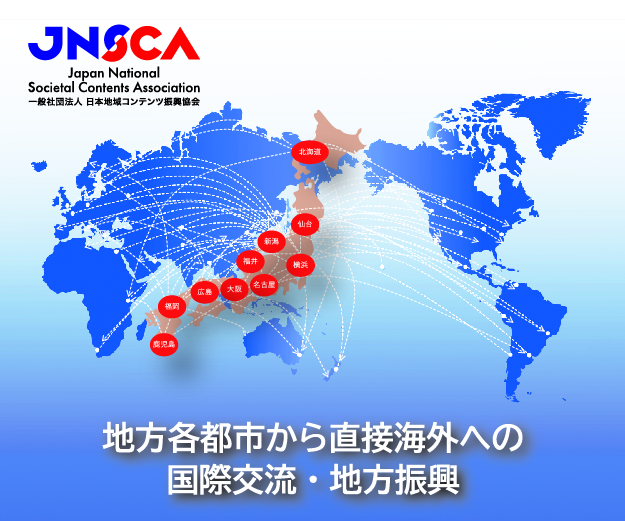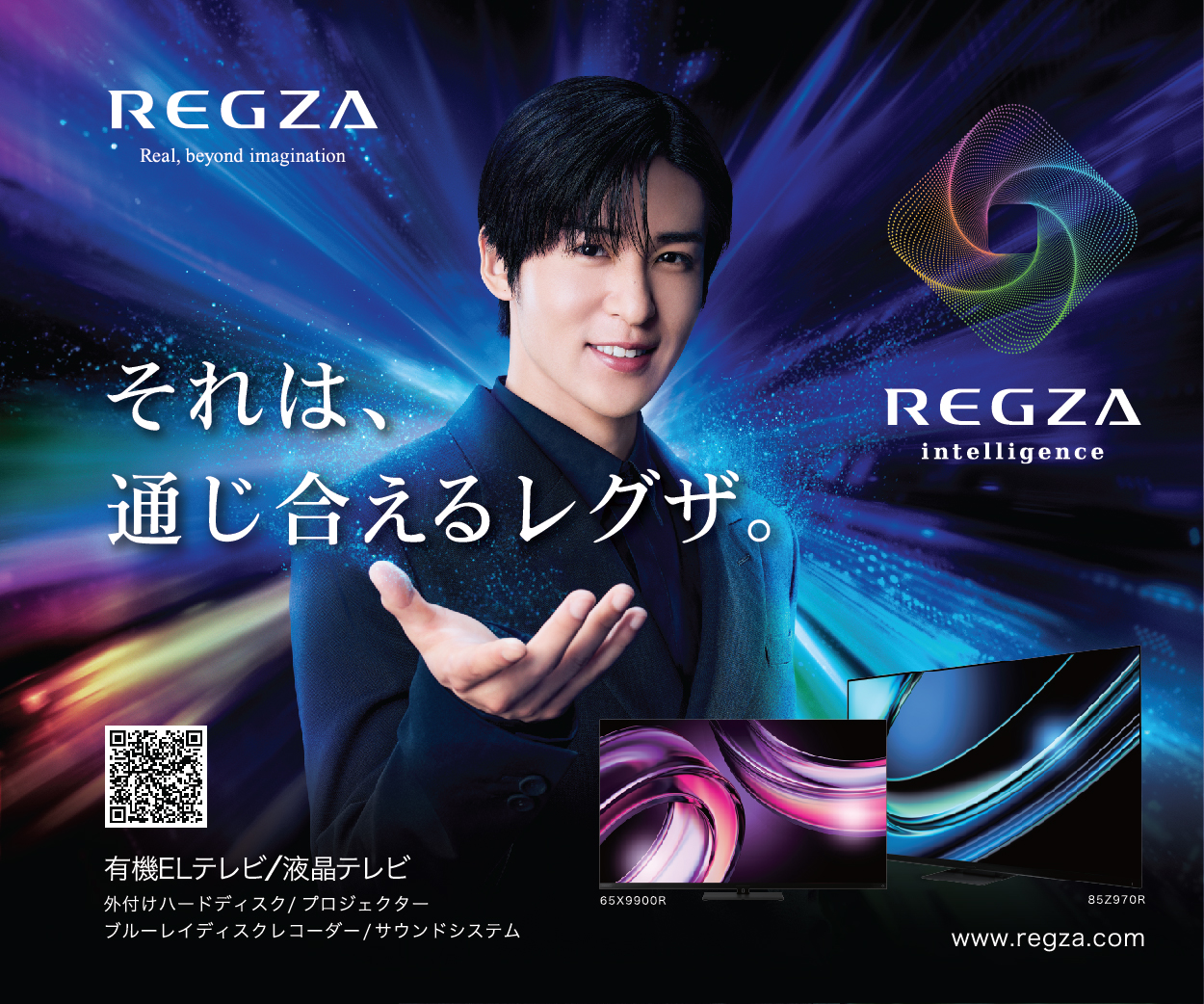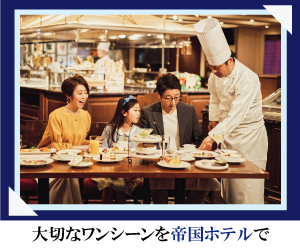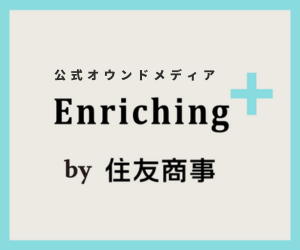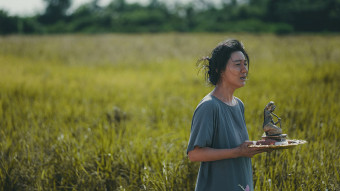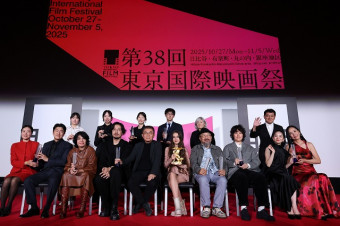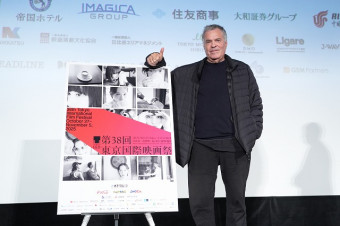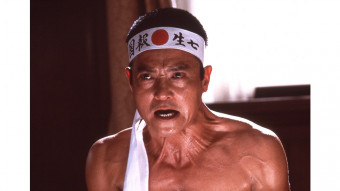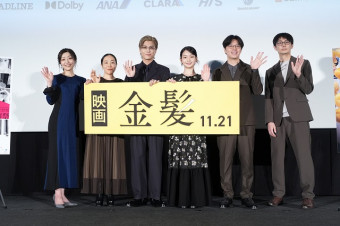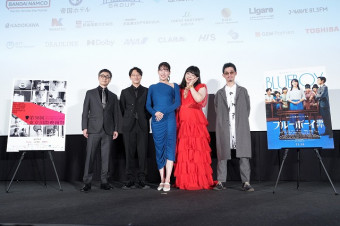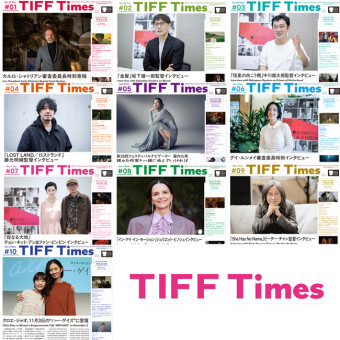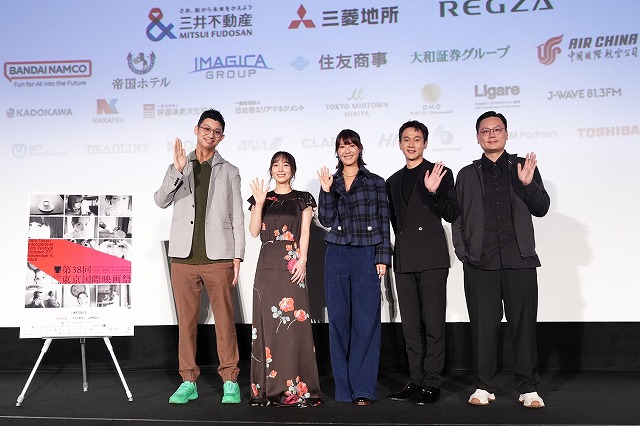
A large contingent of guests from Taiwan, Hong Kong and Japan were on hand for a Q&A session following the October 28 world premiere of Double Happiness, screening in the 38th Tokyo International Film Festival’s World Focus section. They had just watched the film with the audience, with emotions running high afterward.
Mounting the stage to warm applause from a fully packed house were writer-director Joseph Chen-chieh Hsu, actors Liu Kuan-ting, Jennifer Yu and Yoshioka Riho, and producer Clifford Miu.
Hsu spoke first, thanking everyone for coming and noting, “My previous work [Little Big Women, 2020] was also screened at the Tokyo International Film Festival, but due to the circumstances surrounding Covid, I couldn’t visit Japan. I am truly delighted to be able to see all of you in person at this venue tonight.”
Popular Taiwanese actor Liu commented, “I was truly happy watching the film for the first time on a big screen with all of you just now. Now that the film is complete, I feel quite overwhelmed with emotion about it. Thank you all very much.”
Yu, in Tokyo from Hong Kong, mentioned, “This was actually my first experience shooting a film in Taiwan, and today, I saw the completed film for the first time with all of you here. I’m very happy. I really hope that you all enjoyed the movie.”
Japanese actor Yoshioka admitted, “This was my first time taking part in a film shoot overseas, making it a very memorable project for me. Although I only appear at the beginning of the film, after seeing the completed work, I felt it was very carefully made, full of deeply affectionate messages in its intricate details, and with a great sense of humor. I am truly happy to have been a part of such a wonderful film.”
She also mentioned,“ Recently, I attended a film festival in Kaohsiung, Taiwan, for a different film I was in, and the Taiwanese people welcomed me so warmly. So, this time, I hope to have a warm exchange with all of you here and with the Double Happiness team, who came from Taiwan.”
Producer Miu had also worked with Hsu on his debut film, and told the audience, “As the director mentioned, his previous film was screened here, but we couldn’t attend at that time due to the pandemic. I’m very happy to see the completed film with all of you today, in such a large cinema and on such a big screen. I am also delighted to be here on stage with the director and this wonderful cast. I hope you all enjoyed the film.”
TIFF Senior Programmer Ishizaka Kenji asked Yoshioka the first question. “You mentioned in your greeting that you only appear at the beginning,” he said, “but watching the film until the end, your role felt like it was important, like you were an ‘angel carrying thunder.’ What are your thoughts on that?”
Responded Yoshioka: “I feel it’s a very memorable and important role. What deeply moved me when watching the film was realizing that the cuttlefish ink pasta that appeared in my scene was the element that connected the two main characters. Jennifer has a line about reminiscing about their time together while eating cuttlefish ink pasta, and the sight of them showing each other their blackened teeth—it symbolized something special: a private world where only they could be happy, not about being beautiful for the world, but about showing their imperfections to each other. I felt its great cinematic effect, and I was really honored to be the one to carry that part.”
Asked if the inky pasta had been planned from the script stage, and what his intention was, Hsu nodded, “Yes, it was already written in the script. The idea behind depicting the cuttlefish ink was based on the fact that the protagonist’s father and family home are very traditional and oppressive. The son is therefore a rebel, and the inky teeth represent the happiness he found for himself—something that was not given to him by either of his parents.”
Double Happiness is indeed a film about making your own happiness, but it confines its story primarily to the single most important day of its main character’s life: his wedding day.
Tim Kao (Liu) is the punctilious head chef of a five-star hotel in Taiwan, and he is marrying his Hong Kong fiancée Daisy Wu (Yu). But Tim’s divorced parents refuse to attend the same ceremony—and they each plan to host their own celebration. Complicating things further, the same auspicious date has been chosen for both events and, because Tim’s hotel specializes in lavish weddings, both are booked there.
Tim, Daisy, their wedding planner and various hotel staff are thus forced to orchestrate these simultaneous weddings without allowing either parent to discover that they’ve been upstaged. Needless to say, the day soon devolves into a tragicomedy of errors. Surrounded by a bevy of sharp-tongued relatives, Tim suddenly finds himself beset by memories of his traumatic upbringing… leading him to ponder whether he’s really ready to start a new family of his own.
Liu was asked what he’d found most challenging about the role, and surprised the audience with his answer: “For me,” he said, “the difficult part was that my own child was born while I was shooting this film. Just like the director, after wrapping the shoot, I would go home and immediately switch to being a father, diligently taking care of my child. I was essentially playing this dual role during the day and night as I was completing the film. But the experience was actually very helpful. The birth of my child helped me re-examine the character I was playing and informed my acting, which was very useful for the role. It was difficult, but ultimately a very good thing.”
Yu remarked, “The challenging part for me was that, as you all saw, the bride’s attire is very beautiful, but I had to spend about two hours in makeup every day before shooting. Also, the pure white wedding dress is gorgeous, but honestly, it was heavy. It was also difficult to go to the restroom while wearing it, so I decided not to drink water as a workaround. But seeing the finished product, it was so beautiful that it was worth it.”
A viewer asked Liu why he thought his character chose to get married despite feeling distress or fear about marriage. Said the actor, “My character probably knew before the wedding that it was going to be a very difficult day. However, I don’t think he anticipated that seeing certain people on his wedding day would cause all those past memories to come rushing back. In the film, my character also reflects on the marriage of his own father and mother, questioning, ‘Were they truly happy?’ or ‘Did they truly love each other?’ He had many doubts. When both parents show up on his wedding day, it’s very moving for him as a son; but he also feels overwhelmed.”
He added, “The wedding, or the marriage, is not just about the one my character is entering into. The story depicts the perspective on marriage of his parents’ generation, as well as the problems that we face today.”
Another viewer, noting that there were cast members with different linguistic backgrounds in the film, asked why the director had chosen not to use the Cantonese language more. “In Taiwan,” Hsu explained, “most people who don’t have ties to Hong Kong generally don’t understand or speak Cantonese well. In setting up the characters, we wanted to highlight the difference between Cantonese, Taiwanese and Mandarin. This combination creates a scenario that, while perhaps not strictly international, is like an international marriage. You may have noticed that during a wedding in Hong Kong, they use a red umbrella, but in Taiwan, they never use red; they use beige or black. We wanted to express these differences in the two cultures visually.”
Liu also mentioned, “It’s true that I can understand Cantonese, and I can speak it a little, but I must admit I’m not fluent. When Jennifer and I communicate, even in the film, I generally speak Mandarin. However, as emotions heighten, Jennifer speaks Cantonese, and I understand it, but I don’t speak it back. This relationship dynamic—understanding but not speaking—was a way to express a certain tension between the two characters. I believe that by using both languages in scenes of endearment, we were able to successfully express the relationship between the two characters.”
In closing, the producer announced that the film is scheduled to be released in Taiwan during the Lunar New Year in 2026.“ I hope that one day it will also be released in Japan,” he said.
Q&A Session: World Focus
Double Happiness
Guests: Joseph Chen-chieh Hsu (Director/Screenplay), Liu Kuan-ting (Actor), Jennifer Yu (Actor), Yoshioka Riho (Actor), Clifford Miu (Producer)













